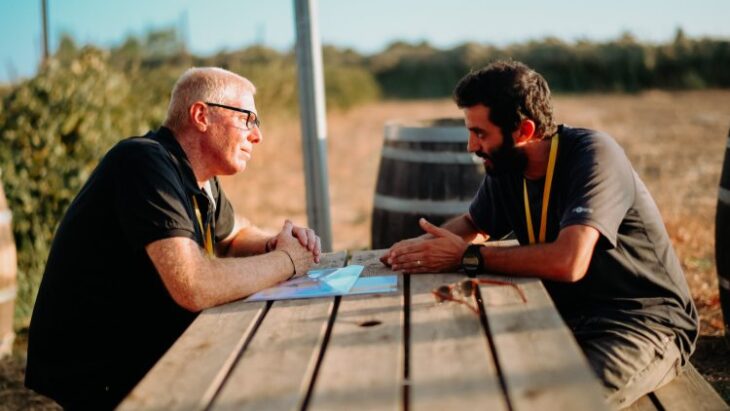For contractors in Israel, growing a construction business brings countless questions and dilemmas—yet often, there is no one to answer them. To address this gap, the Israel Builders Association launched a unique program where some of the industry’s most seasoned executives have carved out time from their packed schedules to mentor rising construction leaders. The second cohort of this initiative is now underway. Ronen Ginsburg, CEO of Danya Cebus, says: “My motivation is to pass on knowledge to the next generation. As a CEO, you experience a lot of loneliness. It’s always good to have a mentor.”
By Dror Neer Kastel, Nadlan Center
Growing a business is challenging in any industry, but even more so in Israel’s high-risk, complex construction sector. Small companies struggle to scale, mid-sized firms don’t know if they should try break into the big leagues, and every stage involves major managerial dilemmas that often have no easy answers.
To ease this journey, the Israel Builders Association and the Foundation for the Encouragement and Development of the Construction Industry launched a program for contractors in Israel in September 2024. The goal of the program is to help young managers and growth-ready companies improve management, refine strategy, and navigate the sector’s current volatility.
About two months ago, the first cohort wrapped up, with 14 senior executives serving as mentors, including Ronen Ginsburg (CEO of Danya Cebus), Micha Klein (former CEO of Africa Israel Residences), Asaf Inbar (CEO of Shikun & Binui Solel Boneh Infrastructures), and veteran contractor Ilan Gordo. The second cohort is now in motion with 13 mentors, three of whom are returning participants.
The mentorship program for contractors in Israel includes five to six in-person sessions, including a kickoff meeting, two to three training days, and two guided learning sessions during the mentorship itself. The mentees, selected through an interview process, include managers in family-owned businesses as well as owners and executives of small companies.
“I’ve had mentors throughout my journey—brilliant people who now lead the industry. It’s always good to have a mentor, especially as a CEO. Being a CEO can be very lonely, and the responsibility rests squarely on your shoulders. Sure, you have owners, a board, and VPs beneath you, but at the end of the day, you’re the one making the final call.”
Ronen Ginsburg, CEO, Danya Cebus
After the mentors are trained and the mentees are selected, the program holds a “matching event”—like the exciting ones from the “Married at First Sight” reality TV show—where each mentee is paired with a mentor, revealed only at the event itself. After that, the actual mentoring period begins, consisting of seven one-on-one meetings between the mentors and the mentees.
“To pass on knowledge to the next generation”
One of the mentors is Ronen Ginsburg, CEO of Danya Cebus, who shared how he joined the program: “The Builders Association reached out and invited me to be a mentor. I’m always happy when universities ask me to pass on knowledge to the next generation or to host students at our company. I try to share my knowledge and experience, to guide and mentor them. That’s the motivation. Sometimes, you do it internally, mentoring your own staff, and sometimes you do it externally. That’s why I chose to take part. I think it’s an amazing program.”
How does a CEO of a major construction firm make time for mentoring?
“It’s not easy,” Ginsburg admits. “Being CEO of Danya is extremely intense, but I carved out the time—three very full days. I worked before and after each session. I started my mornings early and only then head to the sessions, which would often end in the evenings. I had quite a few meetings with my mentee.”
About his mentee, he shares: “He’s a great guy—young, ambitious. I tried to understand his concerns and goals. Even after the official program ended, we’ve continued meeting. Being a mentor isn’t just about four or five sessions, it’s about supporting someone through their development.”
Did you see your younger self in your mentee?
“In some ways, yes. His company is smaller than what I managed, so the questions are a bit different, but the pressures and dilemmas are familiar: Should we grow? How? What are the risks? How do you manage more people? How do you improve processes? The questions are similar across the board.”
Could you have benefited from a mentor when you were starting out?
“Not only when I was starting out, I still feel the need for one today, even after more than 30 years in the industry and with all the knowledge I’ve gained. I’ve had mentors throughout my journey—brilliant people who now lead the industry. It’s always good to have a mentor, especially as a CEO. Being a CEO can be very lonely, and the responsibility rests squarely on your shoulders. Sure, you have owners, a board, and VPs beneath you—but at the end of the day, you’re the one making the final call.”
“These are senior executives from large and complex organizations, and it’s reasonable to assume that those who chose to join the mentoring program feel a deep sense of commitment to the industry in which they grew and were themselves mentored more than once along the way. Otherwise, it simply wouldn’t work.”
Roni Barak, President of the Israel Builders Association
“I’ve been involved with the Builders Association for many years and actively participate in its work,” concludes Ginsburg, “I think it’s wonderful that they’re running a program like this. In the end, it costs them quite a bit of money, but I believe it’s a positive initiative—and not something to be taken for granted. I truly hope it continues to grow and empower people. The second cohort is also excellent. I see the mentors taking part, and it’s a great source of pride that so many senior CEOs and contractors in Israel are dedicating their time for the good of the industry. Because ultimately, this is voluntary, and it’s not easy.”
“I really needed that someone”
One of the mentees who participated in the program was Matan Ken-Tor, Deputy CEO of Ken HaTor Engineering & Construction, where he has worked for 20 years, and is also the son of the company’s founder and CEO, Yoav Ken-Tor. His mentor was Asaf Inbar, CEO of Shikun & Binui Solel Boneh Infrastructures. “First of all, I’ve always really appreciated mentoring programs,” he says when asked what drew him to the initiative. “I’ve spent my entire life in a family-run business, so I don’t really know what it’s like to work elsewhere or in larger companies. I didn’t know who I’d be matched with, but when we were asked to choose the direction we wanted our mentorship to take, I opted for something more professional. I wanted to hear from a senior CEO at a major company and ask him about the many things that have been on my mind.”
He says the organizers made the perfect match: “I needed that kind of person. Sure, I can always consult with my father or our senior staff, but I didn’t have that one senior external CEO to talk to.”
“We’re a company that grows talent from within, so I had a lot of questions about what it’s like to bring in senior engineers and high-level staff from the outside and how to integrate them. I also wanted to understand how bonuses are structured and distributed across teams and things like that. I finally had the opportunity to ask questions I’d been wanting to ask for a long time.”
Matan Ken-Tor, Deputy CEO of Ken HaTor Engineering & Construction
What did the program give you?
“The program gave me the opportunity for many one-on-one conversations, where we could sit together and I could ask about all sorts of issues related to the company’s growth and management—from specific questions like how to structure executive bonuses to how budget oversight is handled. I was able to compare the processes we use with those in a much larger company, and I was glad that the conversations were very open. I never felt restricted by commercial confidentiality.”
Following his own positive experience, Matan convinced his father, Yoav Ken-Tor, to join the second cohort as a mentor. “I had a great time—it was an amazing experience. I got so excited about it that I ended up encouraging my father to join the mentoring program. At first, he asked, ‘Why do I need this?’ But eventually, he was convinced, and now he’s started as a mentor in the second round.”
What new skills did you learn?
“I learned how to manage, how budgeting works in a large company, what the processes are, and who holds which roles. We’re a company that grows talent from within, so I had a lot of questions about what it’s like to bring in senior engineers and high-level staff from the outside and how to integrate them. I also wanted to understand how bonuses are structured and distributed across teams and things like that. I finally had the opportunity to ask questions I’d been wanting to ask for a long time. It’s really amazing to have someone you can talk to about these kinds of professional topics.”
Was your participation motivated by a desire to grow?
“Absolutely, we have plans to grow. And I think that when you suddenly get the chance to learn from someone who’s already in the place you aspire to reach, there’s so much to gain.”
Can you share a few words about your mentor?
“I have to say, first and foremost, it was my mentor who made sure the meetings actually happened. As a mentee, it’s sometimes a bit uncomfortable to initiate the meeting, but Asaf was incredibly kind, open, and welcoming, always saying, ‘Come over, let’s meet, let’s sit down.’ He took responsibility for making sure the meetings took place, that they were well-organized and substantial, because sometimes, as a mentee, you feel like you’re taking up too much of their time.”
“Teaching them to take a step back”
Idit Geva, owner of Shalom & Natan Real Estate Development and Construction, also served as a mentor in the program’s first cohort. “I think young companies today face a lot of challenges, and those with entrepreneurial experience can really help shorten the process for them,” she says. “That’s why, when the Builders Association reached out and asked me to join the program, I agreed.”
“I helped my mentee make a significant managerial leap. The company had taken on projects of various sizes, so we created a comparison table to evaluate which project scale suited them best, where their strengths lay, and where they were most profitable. Another key question was how they envision themselves five years down the line.”
Idit Geva, Shalom & Natan Real Estate Development and Construction
How was your experience?
“It was a very rewarding experience. At the end of the day, I was able to help my mentee take a real step forward in management and in how they view the organization.”
Where did you feel you provided the most value?
“By teaching my mentee to take a step back to look at the company and organization as a whole—analyzing where they’re more profitable, where there’s room for efficiency, where staff is needed or not—and based on that, deciding which projects to take on. The company had taken on projects of various sizes, so we created a comparison table to evaluate which project scale suited them best, where their strengths lay, and where they were most profitable. Another key question was how they envision themselves five years down the line.”
Do you wish you had a mentor when you were getting started?
“Personally, I didn’t feel the need for a mentor because we’re a family business, so I had natural mentors around me. But I see, both in our industry and in others, that young professionals really do need a mentor, someone with perspective and a broad view. Even outside the framework of this project, I do similar things. The big difference today is that everything is instant, which makes it harder to truly understand processes and what leads to success.”
What did you learn through the mentoring process?
“The program gave me real tools for mentoring. I had the intuition already, but the program helped shape and refine it.”
“I would recommend the program to every manager”
Another participant in the program was Ronnie Tamam Starer, CEO of A. Barkan & Co., a family-owned company. Her mentor was Itzik Amsalem, Owner and Chairman of the Almog Group. “I chose to join the program because I wanted to grow as a manager and leader in the construction field, to gain practical tools, and to learn from someone with extensive industry experience,” she shares. “I felt I’d reached a point where it was important for me to consult with someone who had faced similar challenges—someone who could offer insights and help me sharpen the strategic direction of my company.”
She says the program exceeded her expectations: “I learned a lot. I gained new perspectives on decision-making, crisis management, and team leadership. The meetings also helped me sharpen my self-confidence and strengthened my sense that I’m on the right path. The program truly exceeded all expectations. It gave me personal and professional value far beyond what I anticipated.”
“My connection with my mentor was exceptional. He was open, supportive, nonjudgmental, and always available for conversation and guidance. Even after the program ended, we stayed in touch. We had a few follow-up conversations, and I truly feel that I now have a professional figure I can turn to as I continue along my path.”
Ronnie Tamam Starer, CEO of A. Barkan & Co.
How was your relationship with your mentor?
“My connection with my mentor was exceptional. He was open, supportive, nonjudgmental, and always available for conversation and guidance. Even after the program ended, we stayed in touch. We had a few follow-up conversations, and I truly feel that I now have a professional figure I can turn to as I continue along my path.”
What traits of his would you like to adopt?
“His calmness in decision-making, his ability to see the big picture without missing the details, and the way he truly listens. He also knows how to motivate without being pushy—he inspires through partnership and shared purpose.”
What’s one takeaway that you would share with others?
“The most important lesson I took away from the program is not to be afraid to ask for help or guidance, even when it feels like you already have all the answers. Listening to someone else can shed light on things you haven’t considered and save you from making mistakes. Seeking mentorship isn’t a sign of weakness—it’s a decision rooted in strength and responsibility.”
Who would you recommend this program to?
“I would recommend the program to every manager, especially younger women in senior leadership roles who want to sharpen their management skills, grow personally and professionally, and learn from those who have already walked this long path as contractors in Israel. A good mentor can truly shift the trajectory of your career.”
“They feel a deep sense of committment to the industry”
Roni Barak, President of the Israel Builders Association, describes how the idea for the program first came about: “It began during Raul Srugo’s presidency, and the first cohort launched back then. It’s part of a long-term process that began during my first term, where we decided to invest in the next generation of leading contractors in Israel and, alongside them, the future leadership of the Association. As part of this effort, we’ve carried out—and continue to carry out—a wide range of training programs, workshops, team-building days, and study tours, all aimed at equipping them with the tools they need to succeed.”
“The mentoring program is another layer within this broader effort by the Israel Builders Association. Based on our familiarity with both generations of contractors in Israel, we recognized the need for such a program. We learned that structured tools exist for this kind of initiative, so we brought in the Institute for Quality Leadership to train the mentors, as is common in leading organizations in Israel and around the world. From our conversations with the mentors, it’s clear that the process has made them even more committed to the success of the younger generation.”
How did you get busy mentors to make time for this project? What motivates them?
“These are indeed senior executives of large and complex organizations, and it’s reasonable to assume that those who chose to join the mentoring program feel a deep sense of commitment to the industry in which they grew—and where they themselves were mentored more than once along the way. Without that sense of commitment, the program simply wouldn’t work.”

Nadlan Center is Israel’s leading real estate news and knowledge platform in Hebrew, created for industry professionals. Founded by experts in the field, it delivers in-depth, up-to-date coverage on urban renewal, planning and construction, taxation, and housing policy — tailored to the needs of developers, investors, planners, and financiers. In addition to its widely read news content, Nadlan Center hosts major industry events, professional conferences, and training programs that support the growth and development of the Israeli real estate sector.
Learn more: https://www.nadlancenter.co.il







